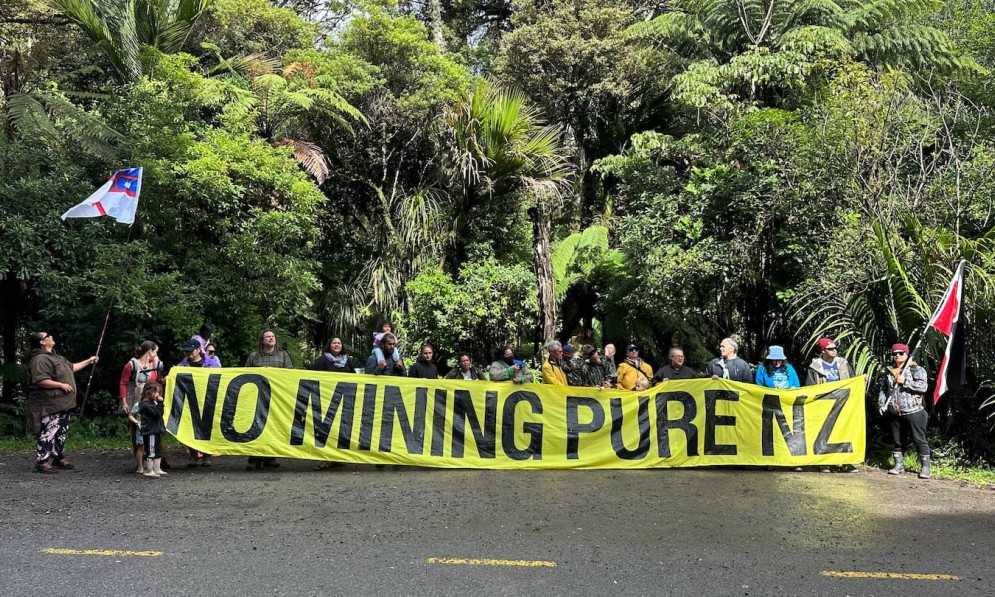This was first published as an opinion piece in the NZ Herald.

Ko au te taiao, ko te taiao ko au, “I am nature, and nature is me.”
If there is one saying that sums up who we are as a country, it’s this. We love the bush, our local swimming holes, we proudly wear the silver fern, we call ourselves Kiwis on the world stage.
We Kiwis have a deep love and affinity with our environment, and for well over the 100 years of Forest & Bird’s existence, this defining characteristic has stayed constant through political, social and economic change.
Today this bond is under threat. A suite of policies under the coalition Government demonstrates a disconnect from the people they represent. New Zealanders didn’t vote for a war on nature.
Senior Cabinet Minister Shane Jones flippantly disregarded Cabinet rules by hiding meetings he personally invited mining industry representatives to. He’s flipped off “Freddy”, the critically endangered Archey’s frog, preferring its extinction over development.
Conservation Minister Tama Potaka reckons saving species is too expensive. And despite the regular reports from her own ministry which point to ongoing decline, Environment Minister Penny Simmonds says the balance has swung too far towards the environment. Climate Change Minister Simon Watts presented an Emissions Reduction Plan that won’t actually hit our targets.
Ultimate responsibility for this environmental nightmare lies with the Prime Minister. It’s Christopher Luxon who is accountable for his Cabinet’s attacks on our natural world, and our national identity. He has silently stood by on savage cuts to the Department of Conservation, rolling back freshwater protections and worst of all (so far), the Fast-Track Approvals Bill.
This great leap backwards is completely unnecessary, won’t speed up development and will wreck our natural environment with no controls.
Why promote a “fast” regime that will take years to implement, creates business uncertainty, and that replaces a previous fast-track system that has only seen nine projects out of 120 declined? It’s a lose-lose for everyone so why is the Government so hell-bent on this new fast-track?
Forest & Bird recently obtained a copy of the original fast-track bill New Zealand First gave to the National Party during coalition negotiations. It included a secret list of projects, which are redacted from the document.
The new Fast-Track bill modelled off this is not about speeding anything up. It’s about letting certain exploitative projects happen that currently can’t because of the environmental damage they would cause.
'It’s Christopher Luxon who is accountable for his Cabinet’s attacks on our natural world.' Photo / Alex Burton
The NZ First list included at least four mines – including a massive new development of multiple coal mines in kiwi habitat on high-value public conservation land. Whether these will be in the new bill is a mystery the Government doesn’t want you to solve.
The Government is refusing to publicly release the list of who applied for the fast-track. They are even refusing to give the final list of projects to Parliament’s environment select committee, currently scrutinising the bill, an approach Victoria University law professor Dean Knight has called a “mockery of Parliamentary sovereignty”.
What are they so afraid of? Sunlight is the best disinfectant, after all. I think they know that if New Zealanders could see the projects that are planned to be initially rubber-stamped, and what their environmental impacts will be, there would be a revolt.
The recent U-turn by the Government, preventing ministerial decision-making on approval of fast-track projects doesn’t go nearly far enough. The proposed law will still override existing environmental laws and cut experts and communities out of the process.
The country has seen this before, such as the former Tasman pulp and paper mill on the outskirts of Kawarau. Thanks to an older fast-track law, Kawarau has been left with a toxic legacy. The jobs have gone, the mill has closed, but the pollution remains.
New Zealand’s proud international reputation is based on how we’ve defined ourselves as citizens of our country: deeply connected to nature, and staunchly protective of it. The current changes to environmental protections – among the most damaging we have ever seen – put that at risk.
It seems apt to be writing this during Conservation Week, with its theme of “Take action for conservation”. Forest & Bird is standing up and fighting back against these reforms. You can take action by letting your MP and the Prime Minister know that you don’t back their war on nature.
I was at the Bluegreens Environmental forum in Blenheim in March 2023, when Luxon spoke on his vision for the environment. He said: “At the core of our commitment is financial and environmental responsibility, sustainability and local decisions on local issues.” That sounded like a solid approach.
Right now, his Government’s policies constitute a war on nature, and by extension, a war on who we are. I’m pretty sure nobody voted for that.
